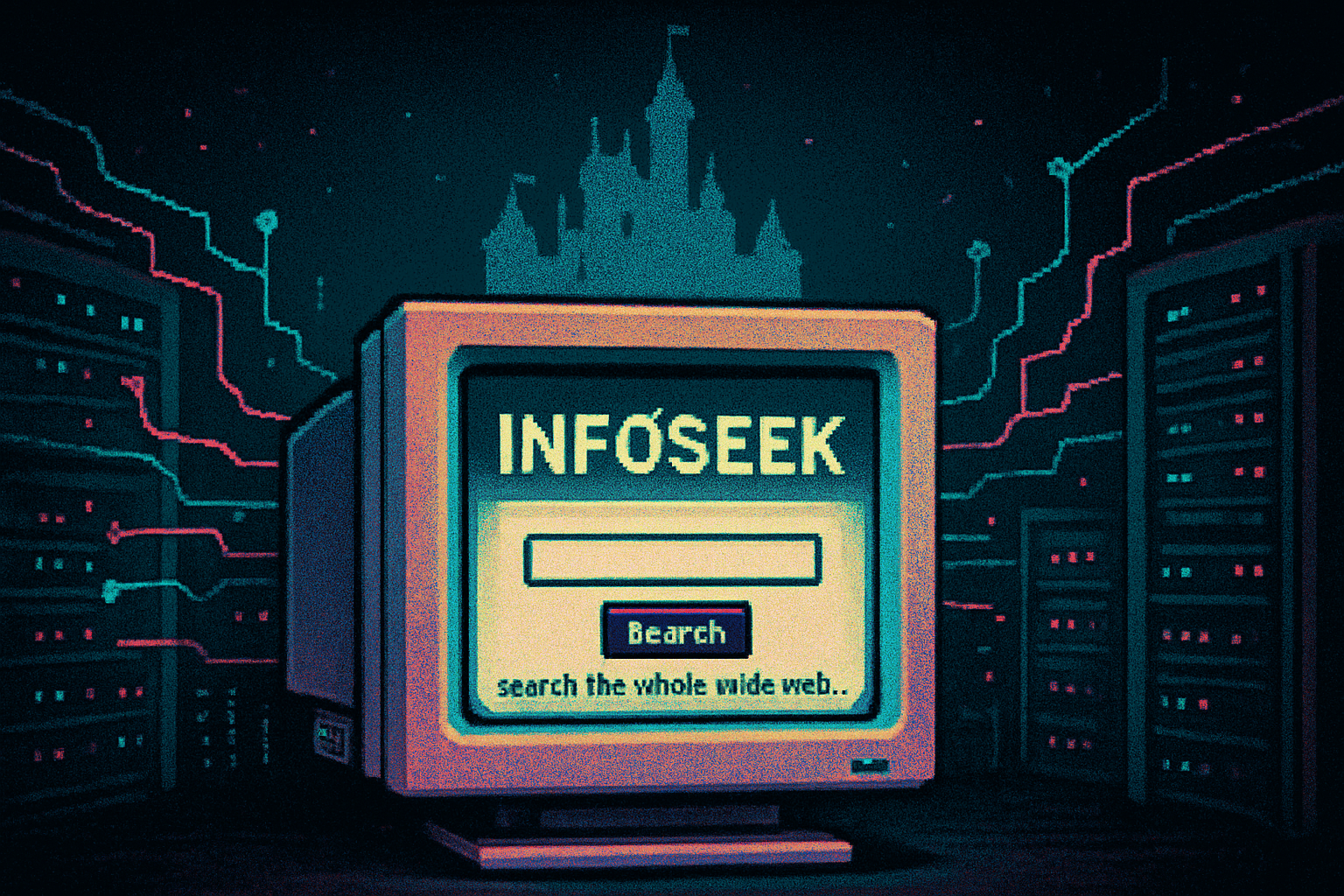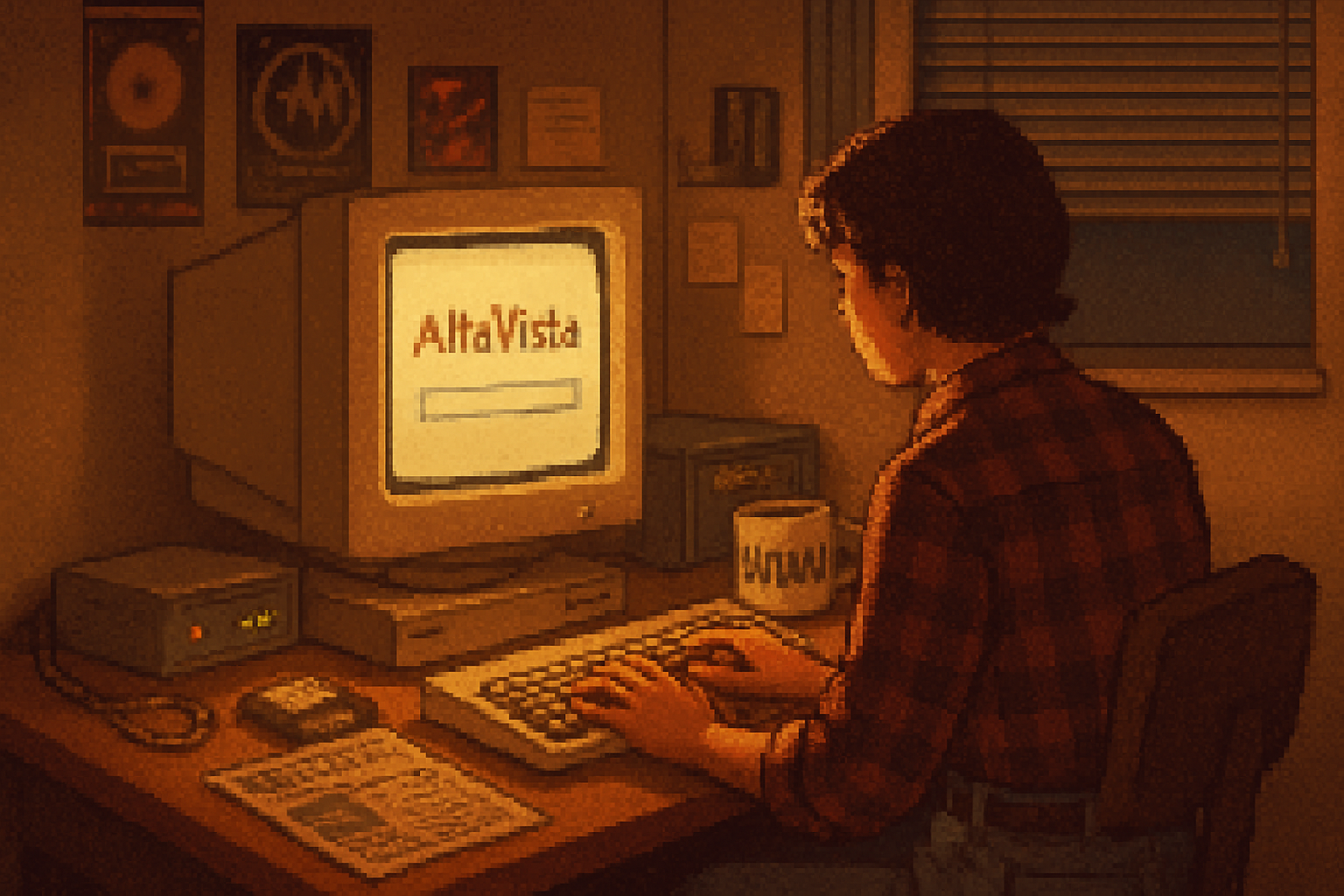· retrotech · 6 min read
The Rise and Fall of Infoseek: Lessons for Today's Search Engines
Infoseek was one of the 1990s search pioneers: fast, simple, and briefly dominant. Then Disney bought it, the web turned meaner, and Infoseek vanished. This post unpacks what Infoseek did right, where it went wrong, and what modern search engines should learn from its arc.

It begins with a small image burned into the memories of anyone who lived through the first web: a clean white page, a single search box, and the thrill of finding something you hadn’t expected. For a few years in the mid‑90s, that experience meant Infoseek.
Anecdote: In 1997 many of us treated search like a magic trick. Type a word. The internet coughs up relevance. Infoseek often felt like the fastest magician in the room. Then a big media company showed up, poured capital and strategy into the hat, and the trick quietly stopped working.
A quick timeline
- Founded in the mid‑1990s by a group of entrepreneurs, Infoseek rose fast as one of the early web search portals. See the company history on Wikipedia for the details: https://en.wikipedia.org/wiki/Infoseek
- In 1998 The Walt Disney Company acquired Infoseek and used its technology to help build the GO Network (go.com): https://en.wikipedia.org/wiki/Go.com
- Over the next few years the Infoseek brand and technology were absorbed into Disney’s portal strategy, and by the early 2000s the name had effectively disappeared from the mainstream web.
(If you want an authoritative domestic slice of the era, the go.com page explains how media conglomerates imagined the web in 1998: https://en.wikipedia.org/wiki/Go.com.)
Why Infoseek rose: a short list of virtues
- Speed and simplicity. Infoseek embodied the best 90s search UX - minimal chrome and fast results. When the web was chaotic, speed and clarity felt like competence.
- Early focus on search as a product. Unlike portals that hoarded links and splash pages, Infoseek treated search as the user service it was - a single thing done well.
- Agility. Small teams, short feedback loops, quick experiments. The web rewarded rapid iteration at that stage.
These are not quaint observations. They track the basic business mechanics of search: low friction for users, and a product that scales with a small, highly skilled team.
Why Infoseek fell: a convergence of strategic mistakes
Infoseek didn’t die for a single reason. It was the classic startup tragedy: many small missteps add up to critical strategic drift.
- Acquisition and cultural mismatch
- When Disney bought Infoseek to help build the GO Network, a nimble search shop became a component in a broad media playbook. Media conglomerates in 1998 wanted portals-one‑stop destinations with advertising bundles, branded content, and cross‑promotion. Search, by contrast, needed relentless engineering and product focus.
- The merger diluted priorities. Engineering roadmaps took a back seat to corporate partnerships and portal design. The result was incrementalism where bold iteration was required.
- Monetization confusion
- The late 90s were the era of experimentation in online advertising. Few companies had a sustainable playbook. Infoseek’s new owners pushed for portal ad packages and sponsorships rather than the eventual winner - highly targeted, auction‑driven paid search.
- The paid‑search model that later proved dominant (think Overture/GoTo and then Google AdWords) favored direct, measurable ROI. Infoseek’s direction didn’t move fast enough to invent or fully embrace that model. See how Overture shaped paid search here: https://en.wikipedia.org/wiki/Overture_Services
- Failure to commit to algorithmic leadership
- Search is ultimately a technical arms race. Relevance-not branding-wins long term. Google’s PageRank and relentless engineering focus changed the game - better relevance, massive indexing infrastructure, and an obsession with metrics.
- Infoseek’s story is a reminder that product and algorithmic differentiation require continuous investment. Trading engineering cycles for portal features is a kind of slow self‑sabotage.
- The wrong metaphor for the web
- In 1998 many companies treated the internet as a new TV - content channels, pageviews, and ad bundles. That metaphor shaped strategy. Infoseek’s absorption into GO was symptomatic of the era’s misread: the web was becoming a plumbing problem (search, indexing, latency) not merely a content scheduling problem.
Concrete comparisons: AltaVista, Yahoo, and Google
- AltaVista - brilliant early tech, then product creep and commercial distractions eroded its edge. See
- Yahoo - became a giant by curating the web, then lost the platform battle by clinging to portal economics rather than search fundamentals: engineering vs. editorial choice.
- Google - started with a ruthlessly product‑first culture, prioritized relevance and infrastructure, then monetized via an ad product aligned with user intent.
These contemporaries show a recurring pattern: early tech leadership is necessary but not sufficient; organizational alignment and correct monetization matter.
Lessons for today’s search engines (and startups building discovery products)
- Treat search as a product, not a feature
- Search must have its own roadmap, KPIs, and team autonomy. When search gets boxed into a larger media portfolio, it loses the iterative focus that makes it better.
- Prioritize relevance and signal over bells and whistles
- Fancy UX is ephemeral. Relevance is sticky. Invest in better ranking signals, faster indexing, and rigorous offline evaluation metrics.
- Monetize in ways aligned with user intent
- Advertising models that distort relevance create long‑term trust problems. Paid placements are fine, but they should be transparent and (where possible) aligned with user goals.
- Beware culture mismatch in M&A
- Acquisitions can kill value when acquirers and acquirees have different operating logics. Maintain the autonomy of the product team and protect engineering cadence.
- Protect the data loop
- Search improves with user data. Be rigorous about collecting feedback signals (clicks, dwell time, queries) while respecting privacy. A weak data loop is a slow death sentence.
- Keep the experiment engine humming
- Continuous A/B testing, rapid model iteration, and a bias toward shipping are defensive weapons against competitors.
- Don’t outsource core competencies to partners
- Partnerships for distribution are useful; outsourcing core search tech or monetization to third parties is not. Those dependencies become chokepoints.
- Have a clear product identity
- Portal or platform? Product or content engine? Indecision here dilutes investment. Define the mission and allocate resources accordingly.
Concrete, modern prescriptions (what to do tomorrow)
- Audit organizational alignment - give search its own P&L and product cadence.
- Rebalance monetization experiments toward intent‑based ads and subscription models where appropriate.
- Double down on evaluation - invest in offline metrics and adversarial testing for ranking models.
- Build privacy‑first feedback loops so you can learn from users without trading trust for short‑term data gains.
Final thought (the sting)
Infoseek is not a tragedy of incompetence. It’s a parable: when you trade the work that makes a product valuable for an easier path to revenue or prestige, you get revenue and prestige - and a product that stops being relevant. The internet rewarded the teams that kept sweeping the floor under the product rather than polishing the marquee.
That’s the uncomfortable, useful truth for any search team today: build the engine first. Everything else follows.
Sources and further reading
- Infoseek - Wikipedia: https://en.wikipedia.org/wiki/Infoseek
- Go.com - Wikipedia (Disney’s portal strategy): https://en.wikipedia.org/wiki/Go.com
- Overture Services - Wikipedia (paid search history): https://en.wikipedia.org/wiki/Overture_Services
- AltaVista - Wikipedia (another 90s search cautionary tale): https://en.wikipedia.org/wiki/AltaVista



